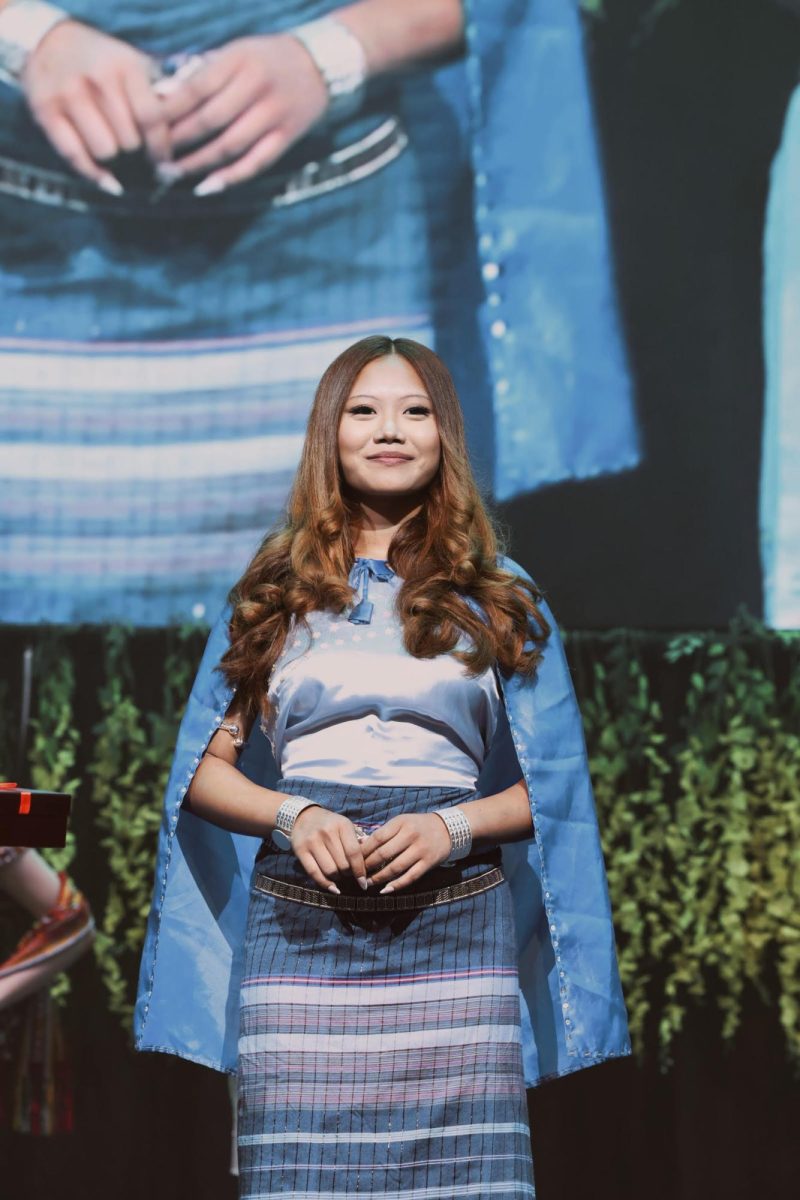About a month after seeing “Wicked” at the Gershwin Theatre, where I sat bent from laughter over Mackenzie Kurtz’s humorous rendition of “Popular,” the film adaptation, starring Cynthia Erivo and Ariana Grande, was released. And with all the sincerity I can muster, I can say without a doubt: I have been changed for the better.
“Wicked” is a musical that turns the classic story of “The Wizard of Oz” on its head, offering a fresh, whimsical perspective on the upbringing of the beloved Glinda the Good Witch and Elphaba, the Wicked Witch of the West. Based on Gregory Maguire’s novel, it explores themes of friendship, power, and social expectations while delving into the backstory of these iconic characters. After winning three Tony Awards and seven Drama Desk Awards, fans exploded online over the announcement of an official film adaptation directed by Jon M. Chu in 2021.
Chu, most recognized for “Crazy Rich Asians” (2018) and “In The Heights” (2021), utilizes a maxismalist-film style, emphasizing scale, spectacle, and bombast within his cinematography. While this style appropriately fits the high-energy dance routines—such as Jonathan Bailey’s lovely rendition of “Dancing Through Life”—it disappointingly overlooked exquisite details, such as the bluebirds soaring over a rainbow during “The Wizard and I,” referencing the 1939 ballad “Somewhere Over the Rainbow,” written for the original “The Wizard of Oz” film.
The narrative is a mix of humor and emotional depth, set against a backdrop of soaring melodies and elegant scenery, of which are only made possible through the dynamic of the two primary witches.
Central to “Wicked” is Glinda, whose bubbly, almost airheaded persona is a façade for the more complex and vulnerable person beneath. This contrast between the superficial and the real is key to Glinda’s character, making her an intriguing blend of comedic charm and emotional depth.
Ariana Grande’s performance does have its merits, and there’s a certain grace to her portrayal of Glinda that shouldn’t be overlooked. Her vocal tone is incredibly clear and angelic, and she skilfully captures the character’s vulnerability and earnestness in moments of reflection, specifically within the final measures of “One Short Day.”
But when compared to the high-energy, almost exaggerated sparkle that Mackenzie Kutz brought to the role in the Broadway production, Grande’s interpretation sometimes feels like it’s holding back.
Glinda’s character, in the stage production, thrives on a delicate balance between being both comedic and deeply human—her quirky, over-the-top persona masks the insecurities beneath the surface.
While Grande’s softer approach works well for the more emotional scenes, it feels like the character’s inherent theatricality and larger-than-life presence could’ve been dialed up a bit more to match the scope of the film.
In contrast, when we think of Mackenzie Kurtz’s Glinda, she doesn’t just sing; she performs in a way that demands attention, even in the subtlest moments. Kurtz’s voice is sharp and precise but also full of playful warmth, and she uses her vocal power as much for comedic timing as she does for emotional depth. The slight edge she gives Glinda’s lines—particularly when delivering her zippy, quick-witted humor—helps ground the character in the world of Oz.
Grande and Chu’s Glinda, on the other hand, at times sounds a bit too soft in delivery, making the character’s insecurity a bit more evident to viewers. I found this particularly noticeable with the delivery of comedic timing of certain moments, specifically her delivery of the infamous “the artichoke has been steamed” quip, of which came across dispiriting rather than humorous. Now, I won’t lie, I initially preferred Kurtz’s portrayal of the character, due to film-Glinda’s lack of hilarity.
However, upon further thought, “Wicked” needed a humanized Glinda.
In the film, it feels as though the motive behind Glinda’s rude comments towards Elphaba are to highlight her lack of satisfaction with her identity, rather than said for the sake of entertainment-value. She’s civilized, she’s more real. The stage-Glinda’s lack of depth within the first act causes her to be shallow, causing her character development in act two to seem a bit rushed. However, with Grande’s more nonchalant Glinda, we are able to truly see her grow at a realistic speed, as we have seen into the character’s insecurities since the beginning of the narrative.
This is perhaps the merit of film adaptations—there is no live-audience to please. We are granted thorough introspection of relationship dynamics, we are granted narratives that may be stepped-into rather than observed. As a result of this, Chu was able to push the complexities of Glinda, even though she is initially seen as a one-dimensional character in act one of the stage production.
Based upon the two-time Grammy award winning singer’s emotional depth thus far, I have confidence she will be able to capture such character growth in the second part of the movie, entitled “Wicked: For Good,” which premieres in November of 2025.








